Sir Cedric Hardwicke . Josheph Cotten . Montgomery Clift
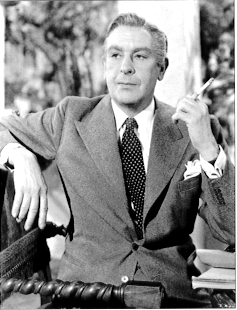 Sir Cedric Hardwicke
Sir Cedric Hardwicke
(February 19, 1893/ August 6, 1964)
The man: Born Cedric Webster Hardwicke on Lye, Worcestershire, he was one of the few english actors with the title of Sir who actually used it in the credits of his movies. This tells us two things about him: that his title sold him well in Hollywood, and that he was an actor of distant and aristocratic presence. After being consolidated as one of the most prestigious actors of the London scene, prestige that earned for him the title of Sir when he was only forty-one, having participated in the World War I, and having refused Hollywood's temptating offers for a long time, he began a fruitful movie career. Due to his phisical appearance, he standed out on the screen for his evil roles, usually authoritarian villains with a caustic touch. Nowadays, he's most remembered for his legacy as a supporting actor than for his brilliant teatral labour.
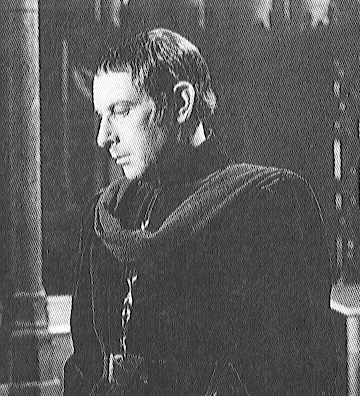 The movies:
His career is one of the most long and versatile of movie history, even he was invlved in quite a few mediocre films which didn't deserve his talent; in any way, they all came better off thanks to his presence. His hollywood debut was playing the marques of Stayne in Becky Sharp(----). He drifted through all kind of genres, the science fiction in Things to come (William Cameron Menzies, 1936), terror in The ghost of Frankenstein (Erle C. Kenton, 1942) and adventure in King's Solomon mines (Robert Stevenson, 1936). 1939 was one of his best years, in which he filmed One borrowed time (-----) his favorite movie, and also got two of his most memorable roles; the
excellent Livingstone in Stanley and Livingstone (Henry King, 1939) and the intense judge Jehan Frollo in the historical mastepiece The hunchback of Notre Dame (William Dieterle, 1939, right image).
On 1943 Fox offered him one of his unusual main roles, as the nazi commandant of The moon is down (-----,1943).
The movies:
His career is one of the most long and versatile of movie history, even he was invlved in quite a few mediocre films which didn't deserve his talent; in any way, they all came better off thanks to his presence. His hollywood debut was playing the marques of Stayne in Becky Sharp(----). He drifted through all kind of genres, the science fiction in Things to come (William Cameron Menzies, 1936), terror in The ghost of Frankenstein (Erle C. Kenton, 1942) and adventure in King's Solomon mines (Robert Stevenson, 1936). 1939 was one of his best years, in which he filmed One borrowed time (-----) his favorite movie, and also got two of his most memorable roles; the
excellent Livingstone in Stanley and Livingstone (Henry King, 1939) and the intense judge Jehan Frollo in the historical mastepiece The hunchback of Notre Dame (William Dieterle, 1939, right image).
On 1943 Fox offered him one of his unusual main roles, as the nazi commandant of The moon is down (-----,1943).
The role: due to his versatility, it's not easy to say in which role he fitted the best. In a very personal apreciation, Tiberius from Salome (William Dieterle,1953), film which reunited him with director William Dieterle and with Charles Laughton after The hunchbach of Notre Dame. His was a modest three minute role, but time enough for him to show his category and to pronounce the inmortal sentence: "What did the illustrious Jules Cesar said? Vini, vidi,vinci?". Splendid.
More on Cedric Hardwicke:
Cedric Hardwicke on the Internet Movie Database.
Cedric Hardwicke on the Yahoo Actors listing.
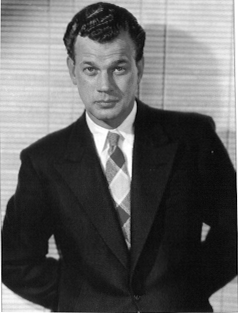 Josheph Cotten
Josheph Cotten
(May 15, 1905 / February 6, 1994)
The man: Born in Petersburg, Virginia, and raised in a good family, he began his career as a theatral critic and a suplent actor in Broadway. His friendship with one of the genius of modern cinema, Orson Welles, whom he met at the CBS radio studios in new York, meant the begin of a long movie career. A classical trained actor, Cotten gave his chaming looks to a good number of morally ambivalent men. Trusting him or not, well... I guess it was just a matter of taste. He was tall, handsome and elegant, and to his image of the perfect southern gentleman, he added his deep voice and his disturbing glances. His intelligence and sobriety got good reflex on the extense list of excellent interpretations he left for the memory.
The movies: He made his movie debut with friend Orson Welles in the official "best movie of history", Citizen Kane (Orson Welles, 1941). Their professional collaboration continued on The magnificent ambersons (Orson Welles, 1942)
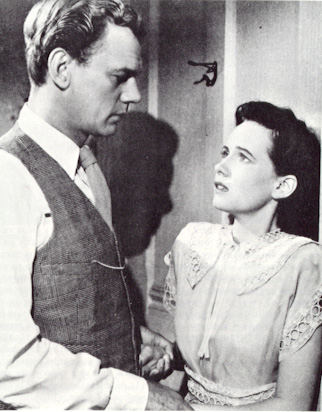 and some years after, on The third man (Orson Welles, 1949). He was the painter in love with a ghost in Portrait of Jennie (William Dieterle, 1948), the quiet gentleman of Gaslight (George Cukor, 1944),the ranch owner in love with a woman who didn't deserve him in Duel in the sun (King Vidor, 1946) and the widow murderer uncle Charlie in The shadow of a doubt (Alfred Hitchcock, 1943, right image). Hitchcock called him again for Under Capricorn in 1949, film in which he coincided again with Ingrid Bergman after Gaslight. Four years after, he killed his unfaithful wife (played by Marilyn Monroe) in Niagara (Henry Hathaway, 1953), a late example of noir cinema. But this time, she deserved it ;-)
and some years after, on The third man (Orson Welles, 1949). He was the painter in love with a ghost in Portrait of Jennie (William Dieterle, 1948), the quiet gentleman of Gaslight (George Cukor, 1944),the ranch owner in love with a woman who didn't deserve him in Duel in the sun (King Vidor, 1946) and the widow murderer uncle Charlie in The shadow of a doubt (Alfred Hitchcock, 1943, right image). Hitchcock called him again for Under Capricorn in 1949, film in which he coincided again with Ingrid Bergman after Gaslight. Four years after, he killed his unfaithful wife (played by Marilyn Monroe) in Niagara (Henry Hathaway, 1953), a late example of noir cinema. But this time, she deserved it ;-)
The role: Even he was perfect in all kind of roles, he was simply memorable on his darker side. If I had to choose one? His sharp, disturbing and unbeliablely sexy uncle Charlie from The shadow of a doubt, where he gave a magistral interpretation of the almost perfect murderer: methodical, decided and always in control. Till the little niece got on his way. Blood is thicker than water, they say.
More on Joseph Cotten:
Joseph Cotten on the Internet Movie Database.
Joseph Cotten on the Yahoo Actors listing.
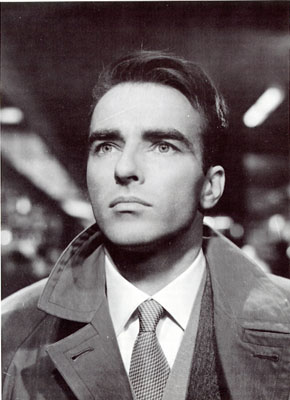 Montgomery Clift
Montgomery Clift
(October 17, 1920 / July 23, 1966)
The man: born Edward Montgomery Clift in Omaha, Nebraska, he was, imho, one of the most talented actors of the cinema history. His posibilities seemed unlimited, and he managed to create a personal style characterized by the psicological complexity he gave to his roles. With his personality, his charm, and his deep sensibility, it looked like he got it all, but his life was a load of anguishes and emotional disappointments. For two years (from 1936 to 1938) he worked as a model in New York, where he begun an admired theatrical career. He moved to Hollywood on 1948, where he raised as a big star in only a year. After that, he disapeared for three years, while the rumours about his homosexuality and his neurosis growed. He came back at the petition of his close friend Elisabeth Taylor. The year of his return, 1957, was the begining of a painful end. After suffering a car crash where he nearly died, the surgery could reconstruct his face, but could do nothing for his spirit, anihilated by dissipation, alcohol and drugs. After 17 movies and four oscar nominations, he died prematurly aged only 45. Despite the rumours, no evidence of suicide was founded.
The movies: his hollywood debut was Red River (Howard Hawks, 1948), followed shortly after by
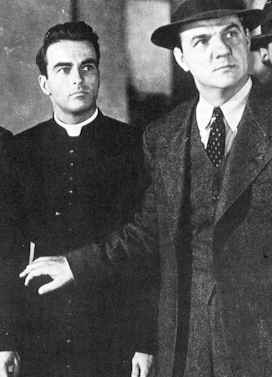 The search(--------,1948) film who earned him his first nomination. After a litle break at the Actor's Studio, he got involved in The heiress (William Wyler, 1949) where he played an inusual villain role, and A place in the sun (------,1951), which reported him his second oscar nomination. The summit of his popularity came with I confess (Alfred Hitchcock, 1952, right image) and, mainly, with From here to eternity (-------,1953) and his third oscar nomination. After his disappearnance, he came back to film Raintree County (-----,1957), year when he suffered an almost deadly carcrash. his health went progresively down, but before the tragedy he recupero his glory with three memorable interpretations: Wild river (-------,1960), Judgement ar Nuremberg
(------,1961, his fourth nomination, this time as a supporting actor) and Wild lives (John Ford, 1963),
where he joined a cast leaded by Marilyn Monroe and Clarke Gable. It was the last movie for the three of them.
The search(--------,1948) film who earned him his first nomination. After a litle break at the Actor's Studio, he got involved in The heiress (William Wyler, 1949) where he played an inusual villain role, and A place in the sun (------,1951), which reported him his second oscar nomination. The summit of his popularity came with I confess (Alfred Hitchcock, 1952, right image) and, mainly, with From here to eternity (-------,1953) and his third oscar nomination. After his disappearnance, he came back to film Raintree County (-----,1957), year when he suffered an almost deadly carcrash. his health went progresively down, but before the tragedy he recupero his glory with three memorable interpretations: Wild river (-------,1960), Judgement ar Nuremberg
(------,1961, his fourth nomination, this time as a supporting actor) and Wild lives (John Ford, 1963),
where he joined a cast leaded by Marilyn Monroe and Clarke Gable. It was the last movie for the three of them.
The role: all the mentioned above are memorable, so whatever I choose, it's not going to be right ;-) Anyway, I always had a debility for Morris Townsend, the playboy and inheritance hunter he played in The heiress Olivia de Havilland, as the poor and ugly rich girl who is tormented by Clift, is also touching.
More on Montgomery Clift:
Montgomery Clift on the Internet Movie Database.
Montgomery Clift on the Yahoo Actors listing.

